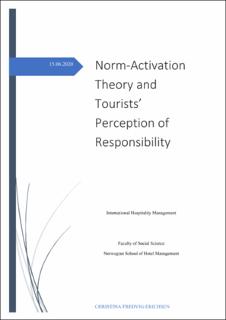| dc.contributor.advisor | Øgaard, Torvald | |
| dc.contributor.author | Fredvig-Erichsen, Christina | |
| dc.coverage.spatial | Norway | en_US |
| dc.date.accessioned | 2020-09-21T08:27:35Z | |
| dc.date.available | 2020-09-21T08:27:35Z | |
| dc.date.issued | 2020-06-15 | |
| dc.identifier.uri | https://hdl.handle.net/11250/2678680 | |
| dc.description | Master's thesis in International hospitality management | en_US |
| dc.description.abstract | Who is responsible for negative tourism impact? In this study I investigate the tourists’ perception of the negative impact in tourism and their perception of responsibility. It is an extension of the work of Gao, Huang and Zhang from 2017. Responsible tourism recognizes the responsibilities the stakeholders have in tourism in order to achieve sustainability. Considering how significantly important the tourist is in the tourism context, it is crucial to gain understandings in their perceptions. The norm-activation theory was applied as the framework for this research, and a self-administrative online survey was used to collect data. A total of 435 participants from 28 different nations completed the survey that was distributed on various social media sites.
Both studies point out that the perception of negative environmental impact influences their ascription of responsibility which in turn affects tourists’ perception of responsibility. However, the present study found correlations within sociocultural and economic impact and ascription as well. Tourists perceive in general the environmental impacts to be more negative than the economic and sociocultural, and they do ascribe and perceive responsibility to themselves in addition to other stakeholders. Additionally, the perceptions of responsibility and the tourists’ own travel behavior coincide with each other, suggesting that the tourists who perceive responsibility also enact on it.
Some practical implications were made in this study in relations to the tourists’ sense of responsibility. Awareness has earlier been said to not be enough in order to get people to respond to the increased focus on sustainability. Yet, over the past few years people have recognized that speaking up and demanding more sustainable options is a responsibility that is important to acknowledge in order to achieve sustainability. | en_US |
| dc.language.iso | eng | en_US |
| dc.publisher | University of Stavanger, Norway | en_US |
| dc.relation.ispartofseries | Masteroppgave/UIS-SV-NHS/2020; | |
| dc.subject | hotelladministrasjon | en_US |
| dc.subject | reiselivsadministrasjon | en_US |
| dc.subject | responsible tourism | en_US |
| dc.subject | tourist | en_US |
| dc.subject | turist | en_US |
| dc.subject | turisme | en_US |
| dc.subject | norm-activation theory | en_US |
| dc.subject | perception of responsibility | en_US |
| dc.subject | tourism impacts | en_US |
| dc.subject | ascription of responsibility | en_US |
| dc.subject | responsible behavior | en_US |
| dc.subject | sustainable demand | en_US |
| dc.title | Norm-Activation Theory and Tourists’ Perception of Responsibility | en_US |
| dc.type | Master thesis | en_US |
| dc.subject.nsi | VDP::Social science: 200::Economics: 210::Business: 213 | en_US |
